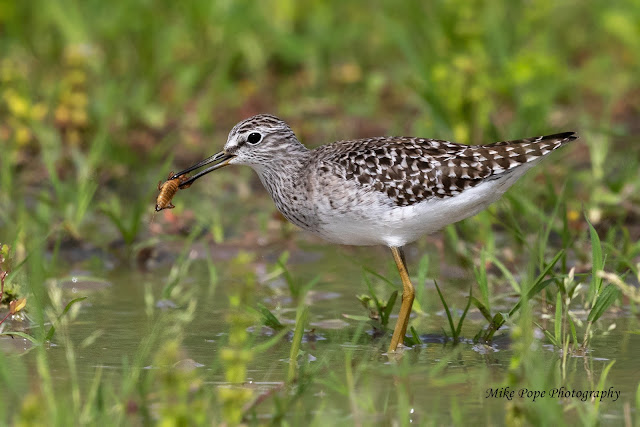As it was the weekend, I could take more time at the farm, although the temperature does ratchet up far quicker now by mid-morning. Nevertheless, when you have both Blue-cheeked and European Bee-eaters on arrival, it is already a good morning.
 |
| Blue-cheeked Bee-eater (Merops persicus) |
 |
| European Bee-eater (Merops apiaster) |
In the palm plantation, a White-throated Robin was still present
 |
| White-throated Robin (Irania gutturalis) |
Along the boundary fence, both male and female Common Redstart's as were seen yesterday
 |
| Male Common Redstart (Phoenicurus phoenicurus) |
 |
| Female Common Redstart (Phoenicurus phoenicurus) |
And a few more Spotted Flycatcher's seemed to have arrived overnight
 |
| Spotted Flycatcher (Muscicapa striata) |
My first Lesser Grey Shrike was seen sitting high on an overhead line
 |
| Lesser Grey Shrike (Lanius minor) |
On the way to the marsh, I stopped in field that had 7 Whinchat's - all male, quite amazing!
 |
| Male Whinchat (Saxicola rubetra) |
And quite a number of Willow Warblers feeding in the adjacent field which had recently been cut which makes the heat haze is really visible..
 |
| Willow Warbler (Phylloscopus trochilus) |
I stopped at a small pool created by the pivot irrigation and enjoyed Red-throated Pipit coming for a bath
 |
| Red-throated Pipit (Anthus cervinus) |
And then spent quite some time with this Wood Sandpiper catching crickets in a shallow pool. In the time I was there, I saw it catch, soften and eat 5 of these crickets. It seemed to take some effort to swallow as you can see how it distends its neck in one of the images..
 |
| Wood Sandpiper (Tringa glareola) |
In the field adjacent to the small pool, a single Western Cattle Egret foraged directly under the sprinklers
 |
| Western Cattle Egret (Bubulcus ibis) |
Down at the marsh, the Red-wattled Lapwing saw me arrive and made itself heard
 |
| Red-wattled Lapwing (Vanellus indicus) |
Whilst a Black-tailed Godwit flushed from somewhere in the marsh as I got out my car - always a good sighting
 |
| European Black-tailed Godwit (Limosa l. limosa) |















No comments:
Post a Comment